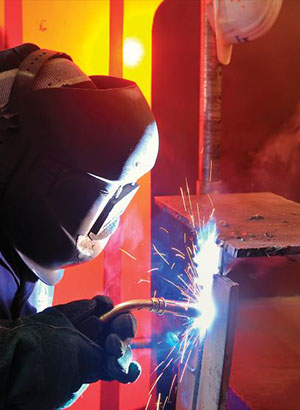NICKEL AND COBALT BASED HARDFACING ALLOY
Kennametal Stellite is a global Solution provider for Wear resistance Applications. This range of hard facing alloys manufactured provides wear resistance to heat, friction and corrosion. Kinnemetal satellite is a renowned world-class manufacturer of wear resistance consumables in the form of rod, wires, powder and electrodes and can be custom engineered to meet individual customer needs.
INDUSTRIES SERVED
Kennametal Stellite offers its proven heat, wear, and corrosion experience and customized solutions to a broad range of industries, including: Aerospace , Oil & Gas, Automotive, Power Generation, Steel, Timber , Glass, Forging and Dental

STELLITE™ ALLOYS
The cobalt-based Stellite™ alloys are our most wellknown and successful hardfacing alloys, with the best “all-round” properties. They combine excellent mechanical wear resistance, especially at high temperatures, with very good corrosion resistance. The Stellite™ alloys are mostly cobalt based with additions of Cr, C, W, and/or Mo. They are resistant to cavitation, corrosion, erosion, abrasion, and galling. The lower carbon alloys are generally recommended for cavitation, sliding wear, or moderate galling. Hence this range of stellite Hardfacing alloys gives excellent wear resistance to all wear factors.

The higher carbon alloys are usually selected for abrasion, severe galling, or lowangle erosion. Stellite™ 6 is our most popular alloy as it provides a good balance of all of these properties. The Stellite™ alloys retain their properties at high temperatures where they also have excellent oxidation resistance. They are typically used in the temperature range 315–600° C (600–1112° F). They can be finished to exceptional levels of surface finish with a low coefficient of friction to give good sliding wear.
DELORO™ ALLOYS
The Delloro alloys are nickel-based hardfcaing alloys with additions of typically Cr, C, B, Fe, and Si. They cover a very wide range of hardness from soft, tough, build-up alloys that are easily machined or hand finished to exceptionally hard, wear-resistant alloys. They can be selected for hardnesses of between 20 and 62 HRC depending on the application. Their low melting point makes these powders ideal for spray/fuse or powder welding applications. The lower hardness Deloro™ alloys are typically used for glass forming molds. The higher hardness Deloro™ alloys are used in severe wear applications, such as rebuilding the flights of feeder screws, and they can be blended with carbides for an even harder deposit. They maintain their properties up to temperatures of about 315° C (600° F) and also offer good oxidation resistance. Overall these alloys provide Excellent Wear Resistance.
TRIBALOY™ ALLOYS
Tribaloy™ alloys, with either nickel or cobalt base, were developed for applications in which extreme wear is combined with high temperatures and corrosive media. Their high molybdenum content accounts for the excellent dry-running properties of Tribaloy™ alloys and makes them very suitable for use in adhesive (metal-tometal) wear situations. Tribaloy™ alloys can be used up to 800–1000° C (1472–1832° F). Overall these range alloys offer excellent wear resistance
NISTELLE™ ALLOYS
Nistelle™ alloys are designed for corrosion resistance rather than wear resistance, particularly in aggressive chemical environments where their high chromium and molybdenum contents provide excellent pitting resistance. As a class, they are also generally resistant to high-temperature oxidation and hot gas corrosion. Care should be taken to select the correct alloy for any given corrosive environment.
JET KOTE™ POWDER
Jet Kote™ powders are used for thermal spraying, and they usually consist of either a carbide-metal combination (e.g., WC-Co or Cr3Cr2-NiCr) or a Stellite™ alloy.
DELCROME™ ALLOYS
These iron-based alloys were developed to resist abrasive wear resistance at lower temperatures, typically up to 200º C. When compared with our nickel and cobalt-based alloys, their corrosion resistance is also comparatively low.
